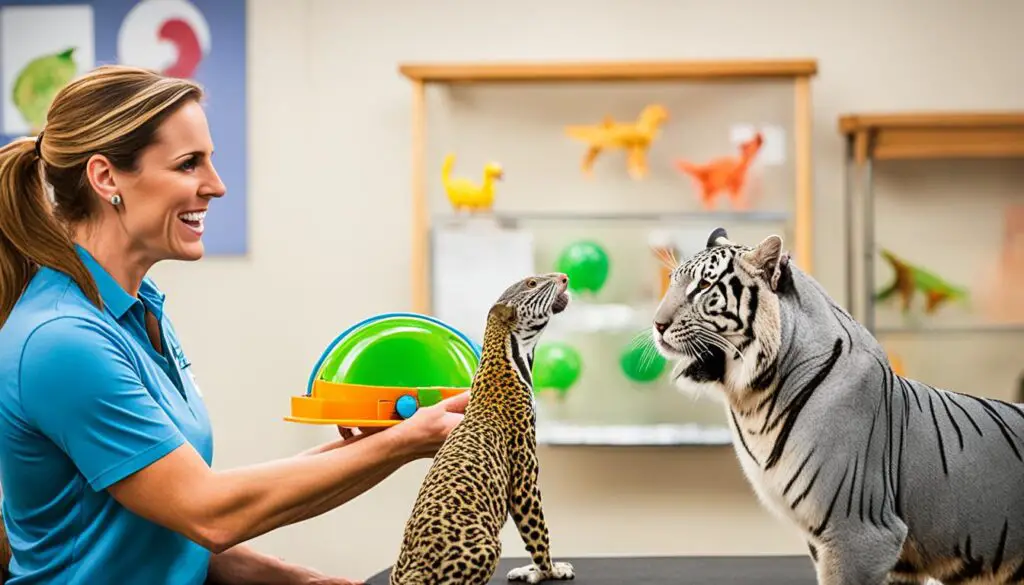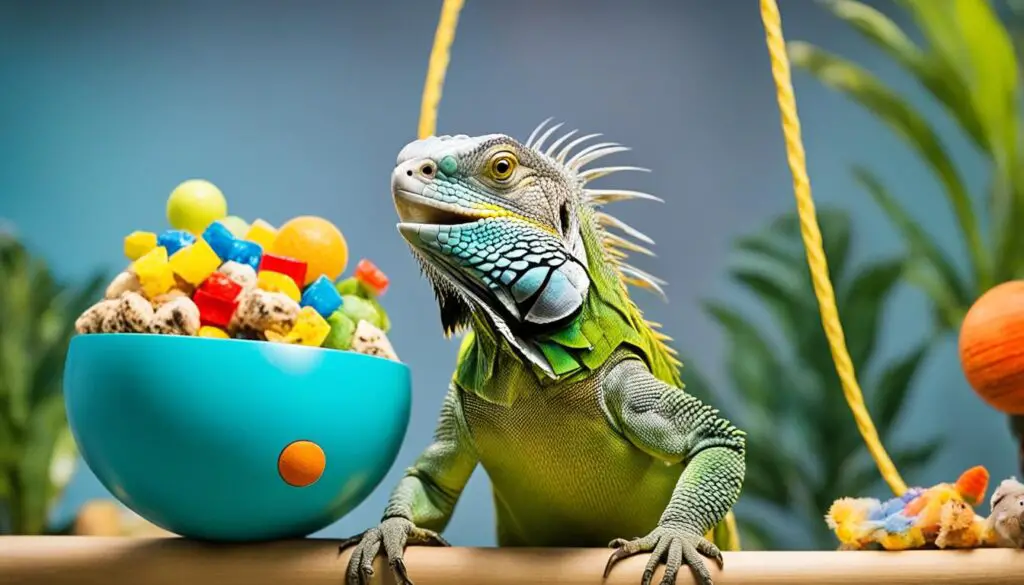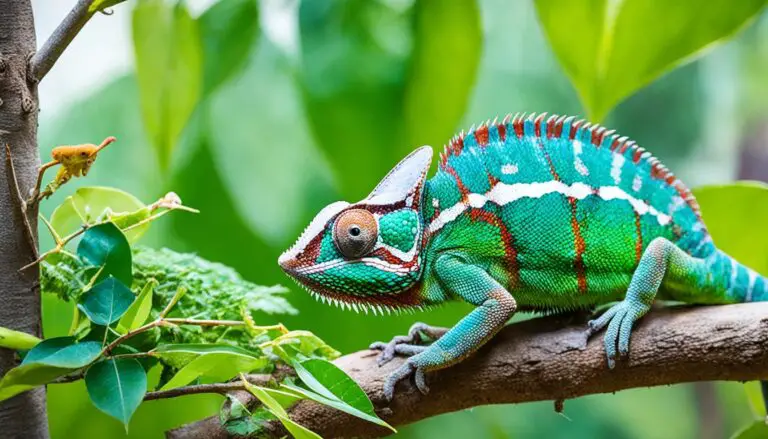Train Your Exotic Pet: Expert Trick Tips
Did you know that over 60% of exotic pet owners say their pets behave better and bond deeper with them through trick training? If you’re wondering how to show off your unique buddy, you’ve found the right spot. Learning exotic pet trick training starts with getting to know your pet’s behavior. Use kind and patient ways. These tips are great for teaching your parrot to wave or getting your bearded dragon to respond to its name.
Use a mix of treats and keep training short to make learning fun for your exotic pet. Starting with simple commands like “sit” is crucial. This prepares them for harder tricks. Also, make sure your pet feels secure and happy during the training. A welcoming training space is important for success.
Key Takeaways
- Understanding animal behavior is essential for pet training.
- Employ positive, patient training techniques for the best results.
- Offer a variety of treats to keep your pet interested and motivated.
- Keep training sessions short and frequent for better retention.
- Start with basic commands before moving on to complex tricks.
- Always ensure the training environment is safe and stress-free.
- The well-being of your pet should always come first during training.
Understanding Your Exotic Pet’s Behavior
Training your exotic pet well means knowing how they behave. Watch how they act and how they talk. This helps make training work better.
Natural Habits and Communication
Every exotic pet acts and talks in its special way. Like, chinchillas roll in dust and make sounds a lot. And chinchillas are different from reptiles in how they act. When a bearded dragon nods or a parrot chirps, it tells us about their feelings. This knowledge is key for trick training weird pets.
Recognizing Stress Signals
It’s crucial to spot stress in exotic pets to keep training safe. Signs can be too much grooming by chinchillas or color fades in reptiles. These cues tell us they might be worried. Changing their space a bit might make them feel better. They’ll then learn better during training.
Building Trust and Bonding
To train exotic animals, trust is everything. Be gentle, stay on a routine, and be curious with your pets. This makes them trust you. When they trust you, training is good for them and you. Use positive ways and notice what’s special about them for best results.
Effective Training Techniques
To train your exotic pet well, you need patience, being consistent, and to understand them. Using effective animal training methods lets your pet have fun while picking up new habits.

Positive Reinforcement
Positive reinforcement is key for exotic pet behavior modification. It means rewarding good actions with treats, praise, or love. This not only helps your pet learn but strengthens your bond with them.
Short and Frequent Sessions
It’s better to have short and regular training times than long ones. This keeps your pet interested and avoids tiredness. It helps in advanced pet performance training without getting your exotic pet worn out.
Using Hand Signals and Cues
Hand signals and verbal cues help a lot in talking to your pet. This makes commands clear and easy for your pet to follow. Changing these signals based on how your pet reacts can make training better.
Eliminating Distractions
It’s crucial to have a spot without distractions for training. Make sure the area is quiet and calm. This way, your pet can focus only on their training. A quiet place is key to using effective animal training methods well.
Species-Specific Training Tips
Training exotic pets varies from one type to another. It’s important to know the unique needs of birds, reptiles, and small mammals. Learning these differences helps train your pet better and enjoy the process.
Birds
Birds are smart and love company. They do great with fun, short training times. Use treats and teach them to follow a target or talk. They will link sounds with actions when you use clear and steady hand signals.
Reptiles
Reptiles learn differently than common pets but can still be trained. They respond to gentle touches and can learn to follow a target with a clicker. Since they learn slowly, being patient is a must. Knowing their natural actions, like basking, helps in setting up their training routines.
“Patience is key with reptiles due to their slower learning pace, but persistence can yield impressive results in specialized pet training.”
Small Mammals
Rabbits, ferrets, and guinea pigs thrive when mentally and physically active. Simple trick training and harness training can work wonders. Varied rewards and treats make learning enjoyable for them.

| Species | Effective Training Method | Key Tips |
|---|---|---|
| Birds | Target and Talk Training | Use vocal cues and hand signals, keep sessions short |
| Reptiles | Clicker and Target Training | Combine gentle handling with patient repetition |
| Small Mammals | Harness and Trick Training | Utilize diverse treats, maintain mental and physical engagement |
Advanced Exotic Pet Trick Training
Delve deep into advanced exotic pet trick training to bond closer with your pet. This training boosts their mind and body. It’s not just for dogs and cats, but also birds, reptiles, and small mammals. We use special methods and tools for this.
Advanced Pet Obedience Skills
Learning advanced obedience is key to a strong pet-trainer connection. These skills are the base for tougher tricks. They keep your pet disciplined and engaged. Key techniques are:
- Consistency: Regular practice keeps pets on track.
- New Commands: Teach them complex tasks for a mental workout.
- Precision Reinforcement: Reward the right behavior accurately.
Specialized Exotic Pet Skills
Special training makes your exotic pets do amazing things. Each type needs different tricks. For example, with birds, you might teach them to talk and fly. For reptiles, it could be about accurate movements. And for small mammals, it’s all about agility through obstacle courses.
- Birds: Train them to talk and fly for incredible vocals and navigation.
- Reptiles: Help them follow directions well with targeted training.
- Small Mammals: Boost their agility and skills with obstacle courses.
Utilizing Clicker and Target Training
Using clickers and targets is cutting-edge in exotic pet training. We signal good behavior with a click or target, then reward it. This makes training clear and reliable.
“Clicker training is a science-based way to communicate with your pet. It’s easier to learn, more effective, and rewarding for pets and their trainers.” – Karen Pryor, founder of Karen Pryor Clicker Training.
Using these modern methods fits well with exotic pets’ natural instinct. It makes learning both fun and successful. Done right, it enhances your pets’ skills and builds a smart, disciplined pet.
Conclusion
Teaching tricks to exotic pets is a rewarding journey. It requires a lot of patience, hard work, and a deep understanding of your pet. You must know and respect your pet’s natural actions. Then, you can use specific techniques for their species. This approach helps in learning fun tricks and makes your pet’s life better.
Advanced training like clicker training and target training meets your pet’s needs. These methods improve how your exotic pet learns and reacts. They keep your pet both mentally and physically fit. This strengthens the bond between you and your special pet.
Essentially, the heart of training exotic pets is building trust and safety. When using these special methods, always focus on your pet’s happiness and safety. With time and the right methods, you both will enjoy the training process a lot. This experience will be rewarding for both you and your pet.
FAQ
How can I start training my exotic pet to perform tricks?
What are some specialized training techniques for exotic pets?
How can I use positive reinforcement effectively in exotic pet training?
What signs of stress should I watch for in my exotic pet during training?
Why is understanding my exotic pet’s natural behavior important?
How should I manage advanced trick training for my exotic pet?
What specific techniques are effective for reptile training?
How can I foster a trust-based relationship with my exotic pet?
What importance does eliminating distractions have during exotic pet training?
Are there species-specific tricks that are easier for certain exotic pets to learn?
Source Links
- https://www.avianexoticpetclinic.com/articles/general/589204-training-tips-for-your-pets
- https://www.wikihow.com/Train-Your-Rat-to-Do-Tricks
- https://exoticpettrainingtip.exblog.jp/30609085/
Peter Stones is the founder of Exotic Pets Place, the leading online resource for exotic pet care information.
With over 10 years of hands-on exotic pet ownership experience, he is deeply passionate about sharing his expertise to help others properly care for their unusual pets.
When he's not writing extensively researched articles or connecting with fellow exotic pet enthusiasts worldwide, you can find Peter at home tending to his own beloved menagerie of exotic animals.




![How to Train Your Exotic Pet to Use a Litter Box [+ Practical Tips], a fluffy puppy in a box](https://exoticpetsplace.com/wp-content/uploads/2023/05/How-to-Train-Your-Exotic-Pet-to-Use-a-Litter-Box-Practical-Tips-a-fluffy-puppy-in-a-box-768x512.jpg)


